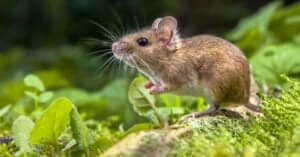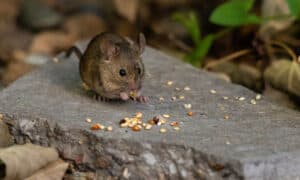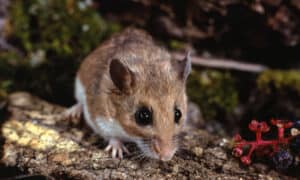Hamsters are delicate little animals and you need to take particular care of all aspects of their lives. They need suitable accommodation and they need a suitable diet. The basis of most pet hamster diets is commercial hamster food. This is usually made up of up to 25 percent protein and up to 40 percent carbohydrates. It also has around 5 percent fat and 5 percent crude fiber. Owners are also recommended to supplement this with a few tasty treats to keep their hamsters happy. However, you have to be very careful with a hamster’s delicate constitution. If you are in any doubt, check with your vet.
There are certain foods that you should never feed to a hamster! Some will make them ill and some are potentially fatal. Here we list the 19 most dangerous foods for a hamster.
1. Uncooked Broad and Kidney Beans
Some beans contain high quantities of lectin which is toxic for hamsters. As a basic rule of thumb, any beans that humans are not able to eat raw should not be fed to hamsters either. Even cooked beans are best avoided because they can be hard for hamsters to digest. It can give them gas and make them bloated.
2. Chili Peppers, Hot Peppers, and Spices
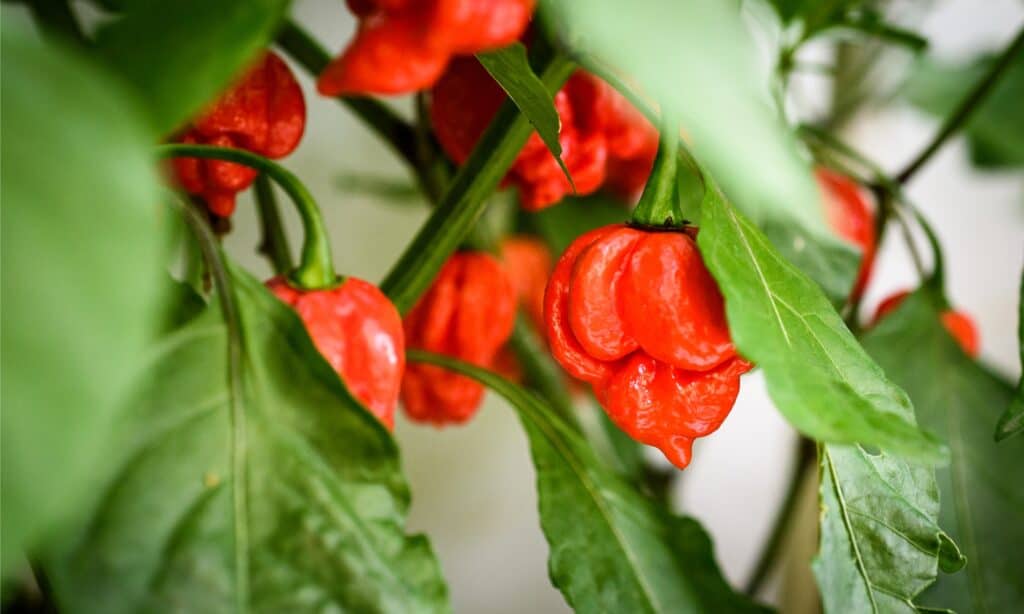
Peppers and spices are not suitable for hamsters.
©iStock.com/_jure
Anything spicy can irritate your hamster’s delicate digestive system. They should not be given any sort of spices especially something as irritating as chili peppers or hot peppers. It is even best to avoid salt and pepper.
3. Packaged and Deli Meats
Hamsters are not herbivores. They are omnivores and in the wild, their diet includes some animal protein – which is meat. This would usually have been insects. However, they do not require meat as part of their diet and can live a perfectly healthy life without it. If you feed your hamster the wrong type of meat, it will do more harm than good! You could try some plain chicken or beef that you have cooked yourself. However, do not feed them packaged or deli meats. There can be other ingredients in this meat that could cause damage to your hamster’s health. Also, do not feed them raw meat.
4. Blue Cheese or Other Cheese Containing Mold
Many hamsters love the taste of cheese. Some owners like to give their hamsters a small amount of cheese as a treat. However, it should never be more than a pea-sized portion and should only be given once or twice a week. If you’re going to do this, it is best to choose a cheese that is low in fat and salt. mozzarella is a good option. It is never a good idea to give hamsters fatty or salty cheeses such as parmesan. Furthermore, you should never give your hamster cheese that contains mold. Stilton or blue cheese contains mold that is harmful to hamsters.
5. Aubergine (Eggplant)
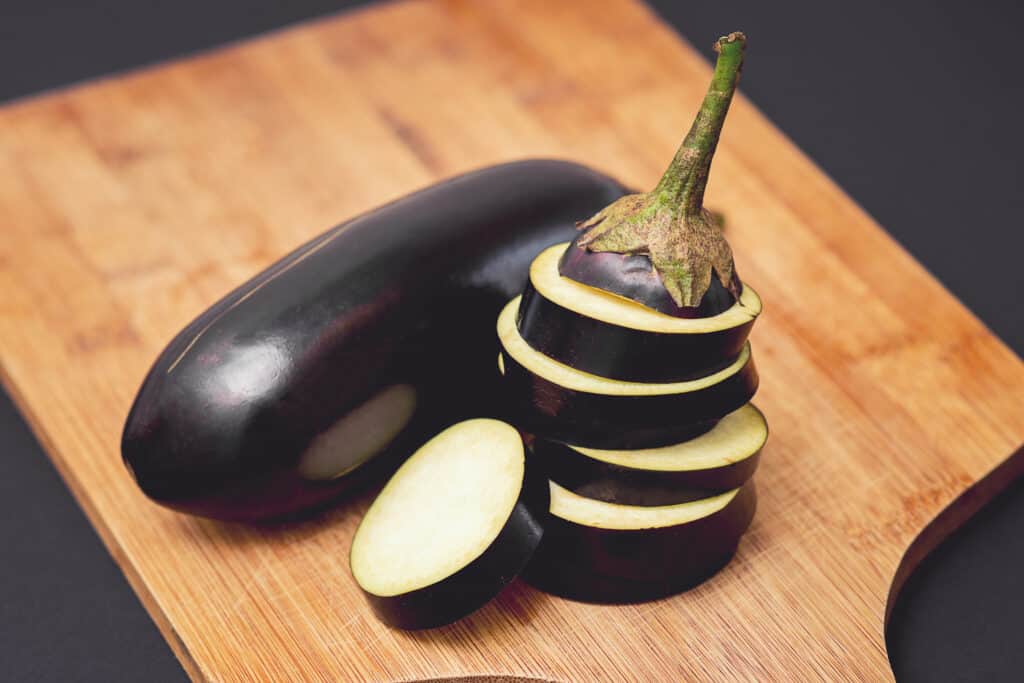
Eggplants are healthy by hamsters can only have tiny amounts.
©iStock.com/okskukuruza
Hamsters love eggplant (which is also called aubergine) and it contains many nutrients that they need. However, it also contains solanine which can be toxic for hamsters. This chemical can cause organ damage and even death in some circumstances. Therefore, you need to be very careful about how much you feed your hamster. Eggplant also contains phosphorus which is also toxic for hamsters in high doses. Overfeeding hamsters on eggplants can give them diarrhea, throat swelling, and even shortness of breath. This is not something that you should give to your hamster every day you may prefer to avoid it altogether.
6. Raw Potato
Green parts of raw potatoes contain toxins that can be harmful to hamsters. The green or sprouted parts of potatoes contain increased concentrations of steroidal alkaloids. These are toxic for several animal species including hamsters. It causes severe gastric upsets and also affects the heart. It is best to avoid giving all raw potatoes to hamsters.
7. Rhubarb
Rhubarb is rich in a substance called oxalic acid. The problem is that this is toxic for hamsters and many other rodents including rats. They are not able to break it down or metabolize it in the same way as we can and so it causes some health issues. It can cause vomiting and diarrhea in hamsters and can also cause kidney stones and some other health issues. Rhubarb is also very fibrous and can cause constipation in hamsters.
8. Raw Garlic and Onion
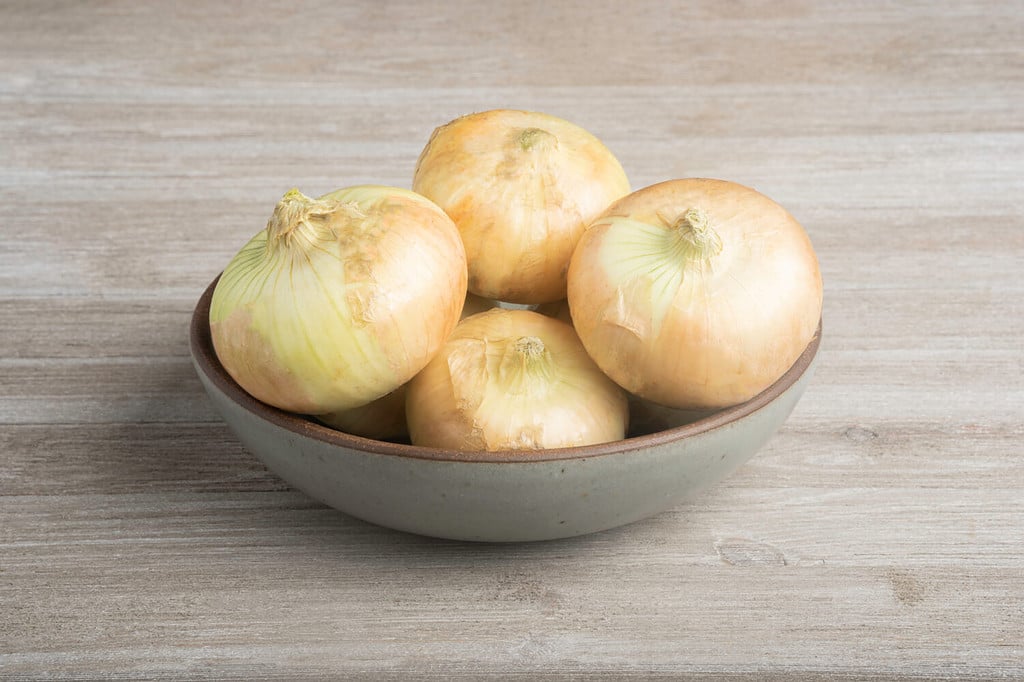
Raw onion is not good for hamsters.
©Dominique James/Shutterstock.com
Garlic and onions fed raw and on their own to hamsters are not a good idea. They contain disulfides and thiosulfates which can be toxic for these little pets. However, if they are cooked and mixed with other foods, for example in a savory baby food purée, they are much safer for hamsters. That said, most owners would prefer to avoid them. The same is true for other plants in this family such as chives, leeks, and shallots.
9. Mint
In small quantities, mint is a healthy and tasty snack for your hamster. There is concern, however, that feeding large quantities of mint over a long period can cause some changes to the brains of rodents. For this reason, you may prefer to avoid it.
10. Bitter Almonds
These should not be confused with sweet almonds which are perfectly healthy for hamsters. Bitter almonds are a particular type of almond that contains the toxic chemical amygdalin. This gets converted into hydrocyanic acid (HCN) in the body. Cyanide is a poison for many animals including humans and hamsters. Hamsters are very small and it takes only a small amount of cyanide to kill them. You also have to be careful when buying a bag of sweet almonds because these can contain a small amount of amygdalin and you may get the odd almond that contains more.
11. Peanut Butter
The problem with peanut butter is practical rather than chemical! It is a very sticky substance and can get lodged in hamster pouches. If you are going to feed your hamster peanut butter, it is best to use a natural product. It is not a good idea to feed a hamster peanut butter in large quantities. However, they do love it, and it may be a good way to get them to take their medication if they are poorly.
12. Caffeine
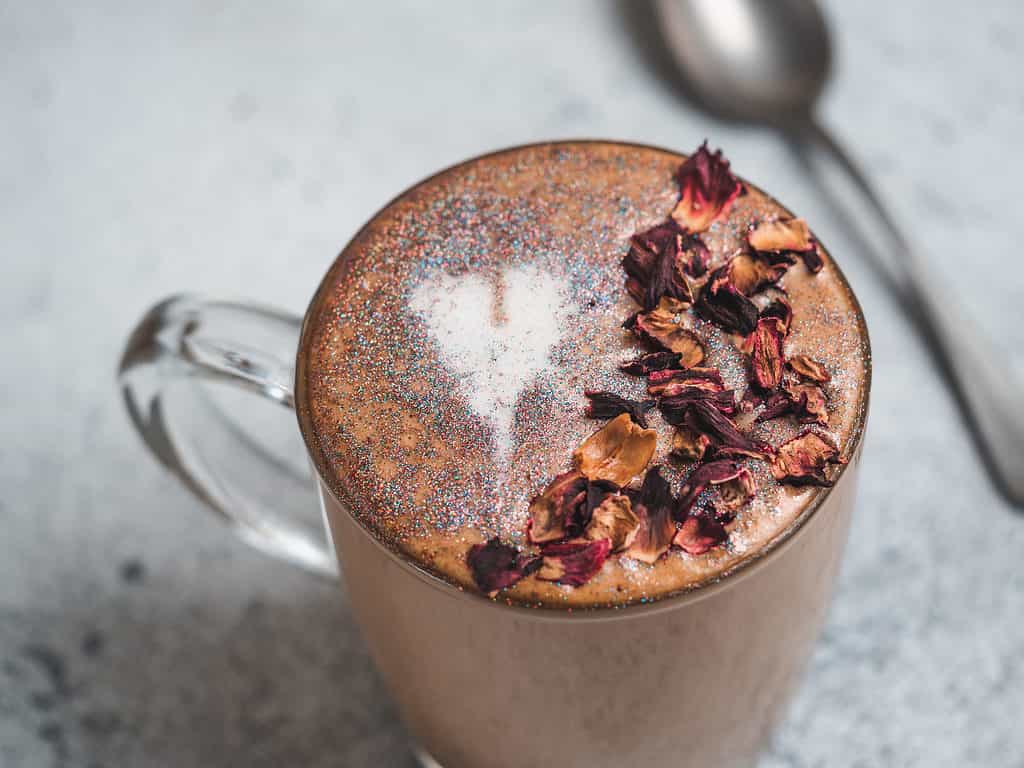
Caffeine increases a hamster’s heart rate.
©Fascinadora/Shutterstock.com
Caffeine is a stimulant that is present in coffee, tea, and some sodas. Whilst many humans cannot make it through the day without a dose of caffeine, it is dangerous for hamsters. Caffeine is a stimulant and is likely to increase your hamster’s heart rate. Hamsters are already very active and do not need this type of stimulation! It could prove to be dangerous.
13. Apple Seeds
Hamsters can eat apple flesh and apple skin. They contain vitamin C, vitamin K, and plenty of calcium. However, they should only be fed to hamsters once or twice a week and in small quantities. The danger arises because apple seeds contain a chemical called amygdalin. This can release cyanide in their intestines and, as we all know, cyanide is a poison! Because hamsters are so small, it would take very little of the substance to cause a problem. Therefore, you should never allow your hamster to eat even a part of an apple seed.
14. Human Junk Food
Human junk food is not good for humans so it’s hardly a surprise that it’s not good for hamsters. The problem with prepared food is that it is difficult to be sure what it contains. Therefore, do not feed this to your hamster. These little pets should only have fresh fruit and vegetables to supplement the commercial hamster food.
15. Very Sugary Food and Refined Sugars
Hamsters love sugary treats but they are not good for them. Human candies and chocolates that contain sugar and artificial sweeteners can upset a hamster’s delicate digestion. Unlike dogs, chocolate is not toxic for hamsters. If they eat a tiny portion of chocolate it is not going to do them lasting harm. However, they should not have this sort of food very often or in large quantities.
16. Celery Sticks
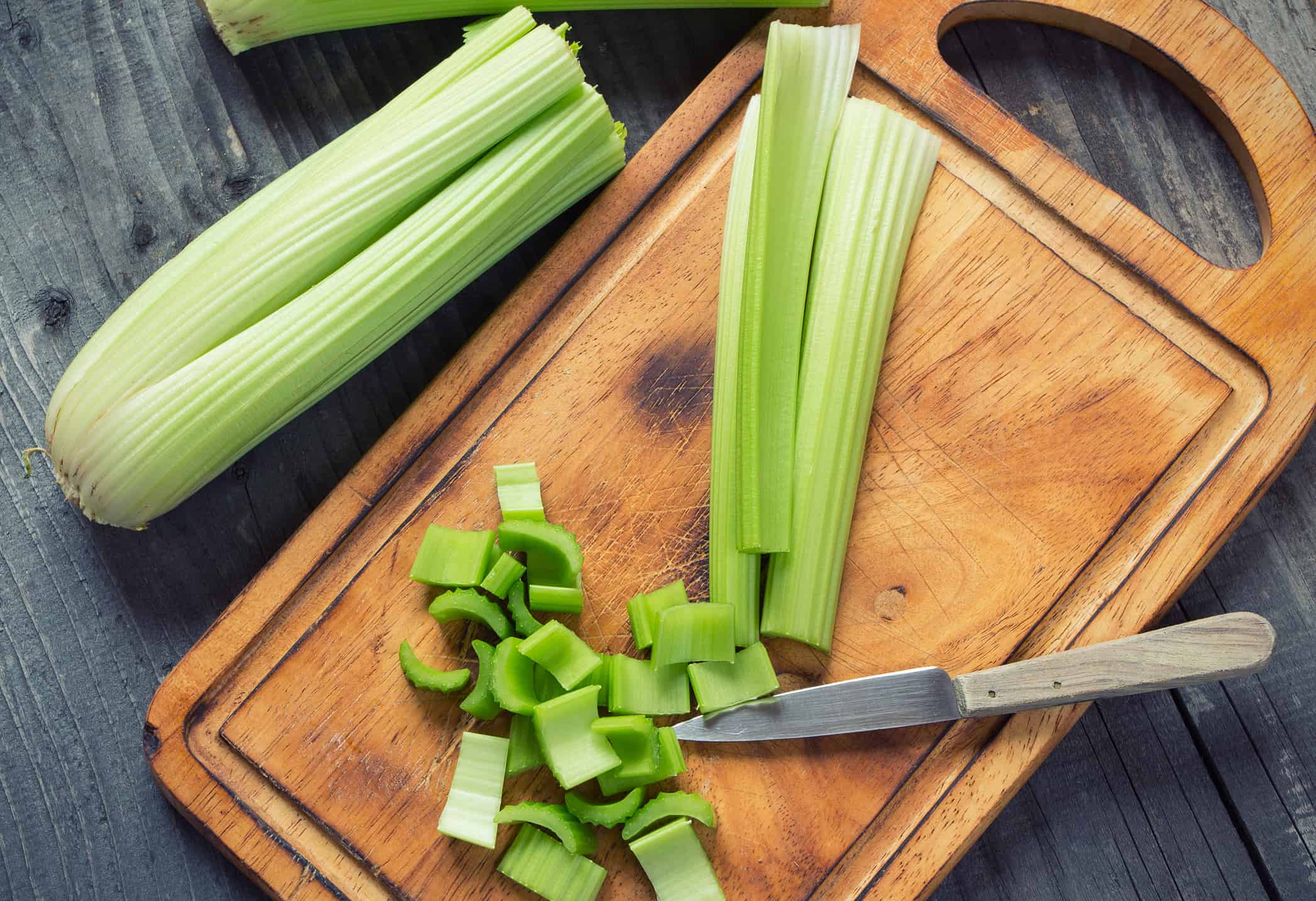
The tough fibers in celery can present a choking hazard for hamsters.
©iStock.com/Lecic
Celery is nutritious but does not contain many calories. It provides essential vitamins and minerals for your hamster. If prepared correctly, it can be a safe snack for them. However, it can also be dangerous. You should only ever feed celery to your hamster if you have removed the long and tough fibers and chopped them into small slices. If you don’t do this, fibrous strands can present a choking hazard for small pets. Never simply throw a stick of celery into the cage.
17. Light Green Leaves
Some foods are more likely to cause diarrhea in hamsters. These include some fresh fruits and vegetables but owners have found that light green leaves can present particular problems. Iceberg lettuce would be a typical example. In general, leaves that are darker in color such as kale and carrot tops are a much safer option. Diarrhea can be a very serious condition in hamsters as they can get dehydrated very quickly and recovery can take some time.
18. Tomato Stems
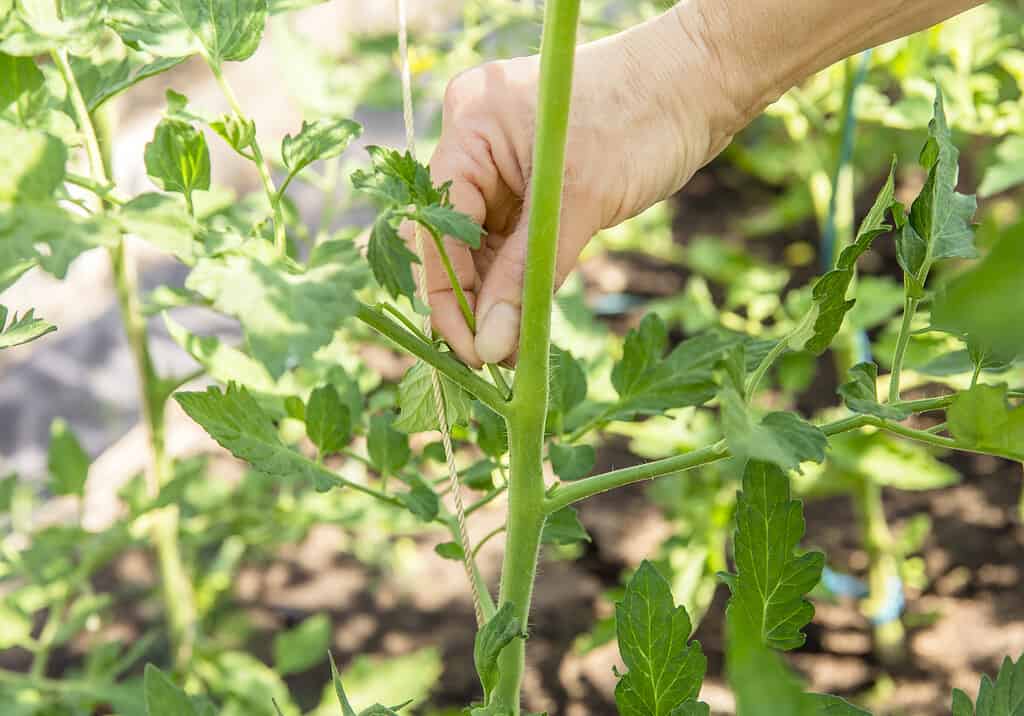
Tomato stems and leaves are not safe for hamsters.
©Helin Loik-Tomson/iStock via Getty Images
Adult hamsters can eat tomatoes in small quantities but always watch them carefully for a reaction. Baby hamsters do not have a fully developed digestive system and therefore should not be given tomatoes.
The stem, vine, leaves, and seeds of the tomato plant contain solanine and should not be fed to your pet. This chemical can cause organ damage and even death in some hamsters. Remember that because hamsters are so tiny it does not take large quantities of this material to make them ill.
19. Pesticides on Human Foods
Sometimes it is what is on the food rather than the food itself that can cause the problem. Pesticides are often used in the production of foods for human consumption. Whilst small quantities may be harmless for humans, they could potentially hurt your pet. Therefore, always wash human foods thoroughly before offering them to your hamster. Organic fruit and vegetables may be the best option.
| Number | Food to Never Feed Hamster |
|---|---|
| 1 | Uncooked Broad and Kidney Beans |
| 2 | Chili Peppers, Hot Pepper, and Spices |
| 3 | Packaged and Deli Meats |
| 4 | Blue Cheese or Other Cheese Containing Mold |
| 5 | Aubergine (Eggplant) |
| 6 | Raw Potato |
| 7 | Rhubarb |
| 8 | Raw Garlic and Onion |
| 9 | Mint |
| 10 | Bitter Almonds |
| 11 | Peanut Butter |
| 12 | Caffeine |
| 13 | Apple Seeds |
| 14 | Human Junk Food |
| 15 | Very Sugary Food and Refined Sugars |
| 16 | Celery Sticks |
| 17 | Light Green Leaves |
| 18 | Tomato Stems |
| 19 | Pesticides on Human Foods |
The photo featured at the top of this post is © tanya_morozz/Shutterstock.com
Thank you for reading! Have some feedback for us? Contact the AZ Animals editorial team.




